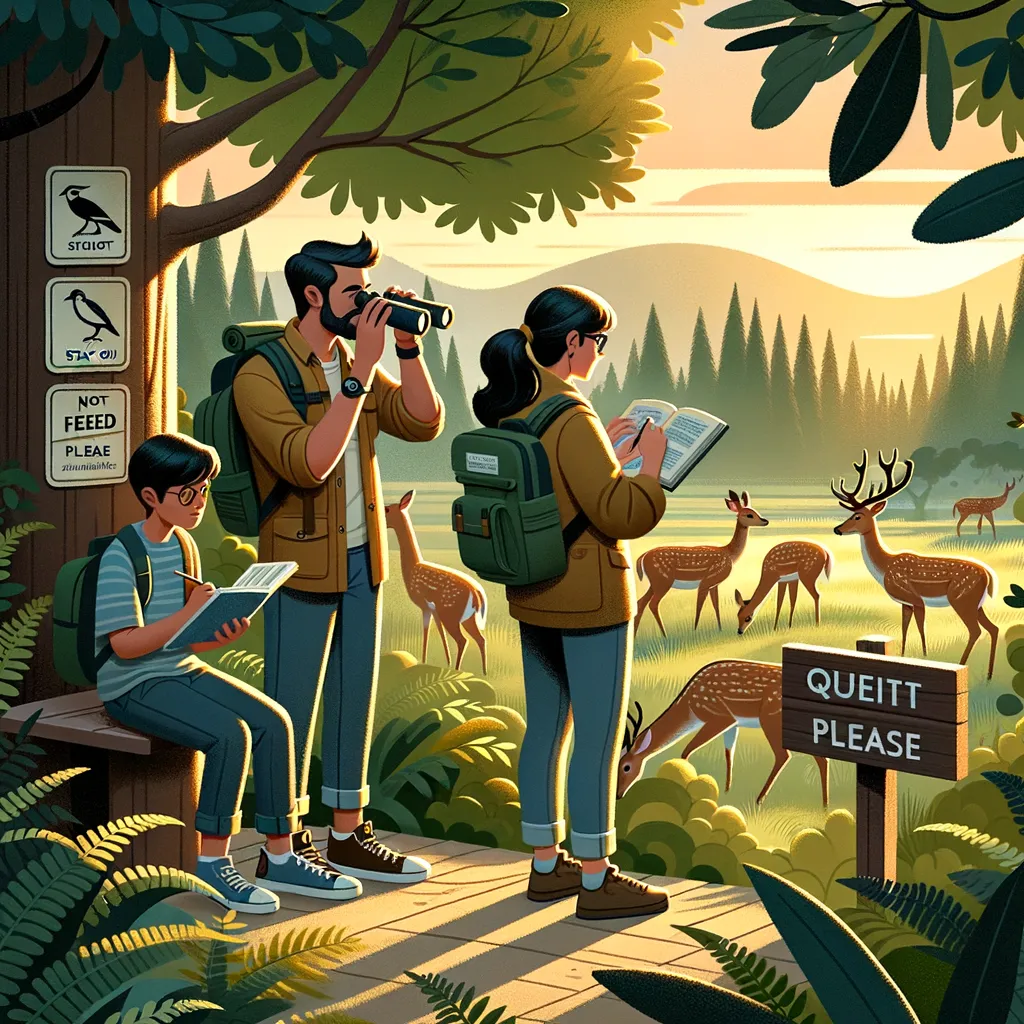Tips for Responsible Wildlife Observation for Parents
As parents, one of the most magical experiences you can share with your children is the exhilarating joy of observing wildlife in its natural habitat. The thrill of spotting a deer in the woods, the awe of watching a hawk soar through the skies, or the delight in seeing a butterfly flit from flower to flower can create lasting memories and a deep appreciation for nature’s wonders. However, engaging with wildlife responsibly is paramount to ensure the safety of both animals and humans. This comprehensive guide provides essential tips for parents to make wildlife observation a safe, enjoyable, and educational experience for the whole family.
Understand and Respect Wildlife Boundaries
To kick things off, understanding and respecting wildlife boundaries is crucial. Animals in their natural environment are not there for our entertainment; they are living their lives, finding food, protecting their young, and simply surviving. It’s important to teach your children that observing wildlife means doing so at a respectful distance. Encroach too closely, and you risk stressing the animals or provoking them into defensive behavior. A good rule of thumb is to use binoculars for that up-close view without invading their personal space.
Do Not Feed the Animals
One of the most common mistakes people make while observing wildlife is the temptation to feed the animals. Feeding wildlife can lead to unhealthy dependencies on human-provided food, alter natural behaviors, and even provoke aggression. Explain to your children the importance of allowing animals to forage and hunt as they naturally would. Not only does this keep natural processes intact, but it also ensures that wild animals don’t become accustomed to human presence, which can be dangerous for both parties.
Leave No Trace
In any outdoor activity, especially when it involves the natural environment, the Leave No Trace principles are key. This means taking all your trash with you, staying on marked trails to avoid damaging native flora, and not removing anything from the park or natural space you’re visiting. Instilling these habits in your children not only protects the environment but also teaches them the importance of conservation and respect for nature.
Choose the Right Time and Place
Finding the right time and place for wildlife observation can make all the difference. Early morning or late afternoon are often the best times for seeing animals, as many are more active during these cooler parts of the day. Researching the habits of the wildlife you wish to observe can also greatly enhance your experience. For instance, knowing that certain birds migrate during specific seasons or that certain mammals are more active at dusk can help you plan your outings more effectively.
Embarking on a wildlife observation adventure with your family can be one of the most rewarding experiences. By following these tips, you’re not only enjoying the beauty of nature but also contributing to its preservation. Remember, teaching your children to observe wildlife responsibly is a gift that keeps on giving. It fosters a love for the environment, encourages curiosity and learning, and instills a sense of responsibility towards our planet.
Stay with us as we dive deeper into how you can make your wildlife observation outings even more enriching for your family, including activities and educational resources that can enhance your experience. This guide is your starting point to a journey filled with exploration, learning, and fun with your loved ones, all while respecting and preserving the natural world around us.
https://en.wikipedia.org/wiki/Camping

5 Things Parents Should Know in Preparing for Responsible Wildlife Observation
Preparing for a wildlife observation adventure with your family is not just about packing snacks and lacing up your hiking boots. It’s about embarking on an enriching journey that respects nature and its inhabitants. To ensure your outings are not only enjoyable but also ethical and safe, here are five essential things every parent should know.
1. Educate Yourself and Your Children About Local Wildlife
Before stepping out into the wilderness, a little homework can go a long way. Educating yourself and your children about the local wildlife you hope to observe adds depth to your adventure. Learn about the animals’ behaviors, needs, and how they interact with their environment. This knowledge not only enhances appreciation but also ensures that your family’s presence does not disturb the natural balance. Engage your children with fun facts, guidebooks, or even interactive apps about the wildlife in the area you plan to visit.
2. Safety First
Safety should always be at the forefront of any wildlife observation activity. Teach your children to recognize and respect wildlife from a distance, understanding that wild animals, no matter how docile they may appear, are unpredictable. Discuss the importance of staying on designated trails and what to do if they encounter wildlife unexpectedly. Preparing a safety kit with essentials such as a first-aid kit, water, sunscreen, and insect repellent can help address basic needs and prevent minor emergencies.
3. Plan Your Visit According to Weather and Season
The time of year and weather conditions can vastly affect your wildlife observation experience. Certain animals may only be visible during specific seasons, or their behavior may change with the weather. For instance, birdwatching enthusiasts might find spring and fall ideal for observing migratory patterns, while those hoping to spot mammals might prefer the cooler hours of dawn and dusk during the warmer months. Checking the weather forecast before heading out can also prevent any unexpected surprises that could cut your adventure short.
4. Respect and Follow Local Regulations and Guidelines
Most natural reserves, parks, and wildlife areas have specific rules and guidelines designed to protect both the environment and its visitors. These might include regulations about where you can walk, areas that are off-limits, and rules about picnicking or camping. Familiarize yourself and your family with these rules to ensure that your presence supports conservation efforts and does not inadvertently harm the ecosystem you are there to enjoy.
5. Foster a Conservation Mindset
Perhaps the most lasting impact of responsible wildlife observation is instilling a conservation mindset in your children. Discuss the impact of human activities on wildlife and their habitats, and explore ways your family can contribute to conservation efforts, such as participating in local clean-up activities or supporting wildlife conservation organizations. Encouraging questions and fostering curiosity about the natural world can inspire a lifelong commitment to environmental stewardship.
Responsible wildlife observation is a rewarding activity that can offer your family a deeper connection to the natural world. By preparing adequately and approaching your adventures with respect, curiosity, and a sense of responsibility, you can ensure that these experiences are positive for both your family and the wildlife you come to observe. Remember, every trip into nature is an opportunity to teach your children the value of conservation and the importance of living harmoniously with our planet. Happy trails!
All the things Outdoors you should know. Camping Information
Disclaimer
The articles available via our website provide general information only and we strongly urge readers to exercise caution and conduct their own thorough research and fact-checking. The information presented should not be taken as absolute truth, and, to the maximum extent permitted by law, we will not be held liable for any inaccuracies or errors in the content. It is essential for individuals to independently verify and validate the information before making any decisions or taking any actions based on the articles.




